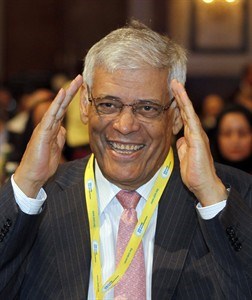
Secretary General of OPEC Abdalla Salem El-Badri of Libya gestures as he waits for the start of a seminar of the Organization of the Petroleum Exporting Countries, OPEC, at Vienna's Hofburg palace, Austria, on Thursday, June 14, 2012. OPEC ministers are coming into a meeting Thursday deeply divided over how much crude to pump, with Saudi Arabia keen to keep a lid on prices, rival Iran pushing to cut production and Iraq expected to back Iran, its longtime foe under Saddam Hussein. (AP Photo/Ronald Zak)
June 14, 2012 - 4:23 PM
VIENNA - OPEC oil ministers agreed Thursday to keep their production target steady, in a compromise meant to defuse rivalries between Iran and Saudi Arabia and to send a soothing message to economically troubled consuming nations.
Oil prices have fallen more than 20 per cent over the past two months, and a statement from the Organization of the Petroleum Exporting Countries citied "downside risks facing the global economy" and ample stocks of crude as being responsible for the trend.
While agreeing to hold the output target steady, however, the statement suggested that OPEC ministers were ready to come together on short notice if prices fell to levels dictating a production cutback. The ministers, it said, "confirmed their readiness to swiftly respond to developments that might place oil market stability in jeopardy."
OPEC accounts for about a third of world crude production and its decision Thursday corresponded with its professed goal of taking volatility out of global oil markets. With the economies of Europe and the United States feeble and even China seeing a slowdown, keeping production targets steady at a time of falling prices was meant to reassure consuming nations that they do not need to fear the added burden of more pricey energy.
But analysts said OPEC was limited in influencing prices.
"The truth is the decision today is not nearly as important as three other events that will occur over the next few weeks," said Jason Schenker of Prestige Economics. He listed Sunday's election in Greece, which could decide whether the country stays in the eurozone; a meeting of the U.S. Federal Reserve in Tuesday; and the July 1st implementation of an EU embargo on Iranian oil as much more significant in determining where crude is headed.
That embargo, combined with a U.S. push for a global ban on imports of Iranian crude figured prominently on the sidelines of the closed meeting.
Iran came to Vienna seeking lowered output to raise prices, while the Saudis were looking to increase production to make crude more affordable. On paper the decision to keep output targets steady was meant to find a compromise between the two positions. But OPEC members normally ignore the official quota — the organization's daily output is now estimated at nearly 32 million barrels.
OPEC Secretary-General Abdullah Al-Badry told reporters that there was a "collective decision" to honour the 30-million barrel ceiling. But the Saudis, and others with capacity, were expected to keep overproducing to make up for any shortfall caused by the sanctions on Iranian oil.
Iran, in contrast, is faced with the prospect of having to cut its output of oil, which makes up nearly 80 per cent of its foreign exchange earnings. Sanctions levied by the U.S. over Tehran's refusal to curb its nuclear program have already cut significantly into exports — from about 2.5 million barrels a day last year to between 1.2 and 1.8 million barrels now, according to estimates by U.S. officials. The European Union embargo will tighten the squeeze.
The oil-related sanctions are only part of the regime of U.N. and other international penalties levied against Iran for its refusal to curb uranium enrichment. Tehran says it is enriching only to create reactor fuel and insists it is not interested in atomic arms, but concern remains strong because enrichment to high levels also can produce the core of nuclear weapons.
Iran has cautioned the Saudis not to use the oil weapon against it, but Iranian oil minister Rostam Ghazemi on Wednesday warned the U.S. and Europe that their tactics will backfire.
"The use of instruments such as sanctions or direct military interventions in energy-producing countries will increase the price of oil and market volatility," he told an OPEC seminar.
On Thursday, he denied that Iran was hurting.
"Our exports remain as before," he declared, adding that the oil embargo will "not have any negative impact on Iran."
In another manifestation of their rivalries, both Iran and the Saudis are fielding candidates for the post of OPEC secretary general, to be filled in December when Abdullah Al-Badry of Libya retires. But Ecuador also is in the race, along with Iraq, and expectations are high that the ministers will opt for Wilson Pastor of Ecuador.
Al-Badry said ministers deferred a decision on his successor to the next planned OPEC meeting in December.
Saudi-Iranian tensions are an embarrassment to OPEC, and Saudi Oil Minister Ali Naimi refused to answer questions on the issue as he prepared to join the meeting Thursday. But he earlier denied tightening the screws on Iran by selectively providing crude to consumers honouring the Iran embargo, telling reporters his country sells to whoever buys.
"We don't sit and say: 'We want to sell to this country or that country (or) whatever,'" he said.
___
Margaret Childs contributed.
News from © The Associated Press, 2012